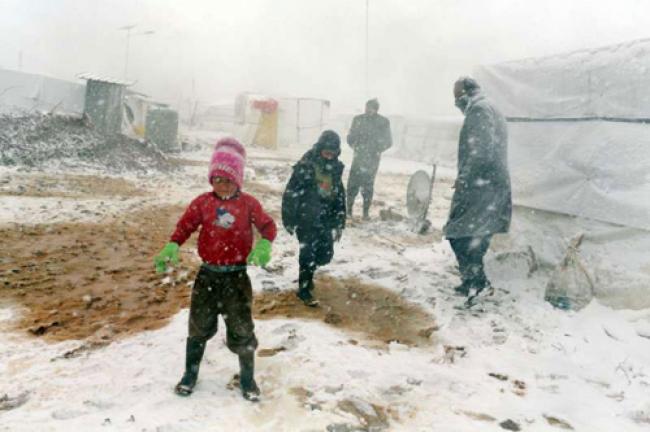Conflict
Crisis/Conflict/Terrorism Lebanon: UN ramps up winter aid for Syrian refugees
13 Dec 2013, 08:32 am Print

New York, Dec 13 (JEN): The United Nations and its humanitarian partners are ramping up efforts to assist more than 800,000 Syrian refugees in Lebanon who are facing the onslaught of cold weather, rains and snowfall as a massive winter storm named “Alexa” moves across the region.
The storm struck Lebanon Tuesday night, bringing snow to higher areas and torrential rain elsewhere, accompanied by high winds. Conditions are similarly grim according to reports from neighbouring Syria and Turkey.
With the support of the Lebanese Armed Forces, the UN High Commissioner for Refugees (UNHCR) and partners were able to speed up the distribution on Tuesday of additional emergency shelter kits – including plastic sheets, timber and tools – to thousands of refugees living in tents in the Bekaa, eastern Lebanon, so far the region most affected by the storm.
Emergency teams continued their work on Wednesday despite blocked roads from the weather conditions. Alternative shelters are also being prepared for refugees whose tents may be affected by the snow, rain and flooding.
UNHCR said it is particularly concerned for the many refugees in Lebanon living in makeshift accommodation, as their homes are fragile and substandard. The number of refugees in Lebanon has increased five-fold over the last year.
“For the hundreds of thousands of refugees in Lebanon, as well as those inneighbouring countries and the displaced in Syria, a storm like this creates immense additional hardship and suffering,” said Amin Awad, Director of UNHCR’s Middle East and North Africa Bureau.
“With Lebanon’s help, we’re doing everything we can to get rapid additional help to people who most need it. This is on top of the winter preparations already done over the past months.”
Some 125,000 refugees living in the Bekaa Valley have already received winter kits and 55,000 more will be reached in the coming days. Humanitarian agencies working throughout Lebanon have already distributed 255,000 blankets and over 6,000 stoves in the past months. Some 45,000 ATM cards with USD 150 each have also been distributed to vulnerable families to buy additional stoves and fuel.
The UN World Food Programme (WFP) and its partners are meeting the food needs of newly arrived Syrian refugees in areas affected by the storm in Lebanon with enough food stocks to feed 150,000 people. Elsewhere in the country, the agency is providing food assistance to over 600,000 Syrian refugees registered with UNHCR using electronic food vouchers.
UNHCR noted that Lebanon is at present the largest Syrian refugee-hosting country in the region, with 838,189 Syrians either registered as refugees or awaiting registration. Unlike other countries neighbouring Syria, there are no established refugee camps. Instead people are living in the community in nearly 1,600 different areas.
Winter conditions are a major worry for the almost 2.3 million Syrian refugees around the region and the over 6 million displaced internally in Syria, where the conflict has passed the 1,000th day mark.
UNHCR Special Envoy Angelina Jolie said this “shocking milestone” should spur everyone involved in the peace conference planned for next month in Geneva to do all they can to end the violence.
“Each of the last thousand days has been a living nightmare for the Syrian people,” she said in a statement.
While the full story of those 1,000 days has yet to be told, Jolie noted that over 100,000 Syrians have died – the equivalent of 100 people being killed each day for 1,000 days.
“We will look back with shame on this period, and be haunted by our collective failure to prevent this killing of innocents… We cannot turn back the clock for the Syrian people. But we have it in our power, as an international community, to prevent another 1,000 days of bloodshed and suffering.”
Snowfall in the Bekaa Valley, the region in eastern Lebanon most affected by a massive winter storm which struck on 10 December 2013. Photo: UNHCR/A. McConnell
More Conflict
- World fails again: Landmine casualties hit record levels as treaties stall
- Explosions, gunfire, panic: Inside the suicide attack on paramilitary forces headquarters in Peshawar that left three security officials dead
- Nigeria in shock: 215 students abducted after bandits invade Catholic school
- Back-to-Back blasts: Delhi shock followed by deadly Islamabad suicide attack, 12 dead
- Chaos in Court! AC explosion shakes Pakistan’s top judicial building, 12 injured



-1763561110.jpg)


